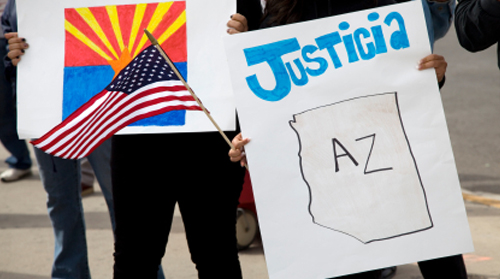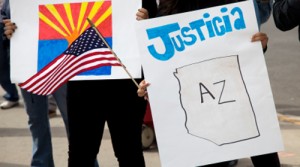Arizona Presents SANE Immigration Guidelines

 By Valeria Fernández, New America Media
By Valeria Fernández, New America Media
PHOENIX — For close to a decade Arizona has been on the frontlines of a divisive national immigration debate, inspiring a wave of anti-immigrant legislation modeled on its own SB 1070. On Wednesday, a bipartisan collation including immigrant rights advocates and business leaders sought to take that debate in a new direction.
The Real Arizona Coalition – comprised of business owners, religious leaders, civil right activists, Dreamers, officials from law-enforcement and former Supreme Court Justice Sandra Day O’ Connor –released a blueprint for immigration reform that calls for the legalization of some 11 million undocumented immigrants now in the country.
 The coalition’s S.A.N.E Solution to Federal Immigration Reform proposes granting undocumented immigrants who entered the country prior to a specified date legal temporary visas after they pass a background check, pay a fine, and back taxes. They would then be allowed to apply for legal residency and citizenship through a lawful but as yet unspecified process that supporters say would be left to lawmakers to work out.
The coalition’s S.A.N.E Solution to Federal Immigration Reform proposes granting undocumented immigrants who entered the country prior to a specified date legal temporary visas after they pass a background check, pay a fine, and back taxes. They would then be allowed to apply for legal residency and citizenship through a lawful but as yet unspecified process that supporters say would be left to lawmakers to work out.
Drafters admit there is some disagreement about this final point, and say it could involve a touchback provision, where applicants are required to return to their home country as part of the process. Those brought here as children would be exempt, they add.
For Todd Landfried, executive director of Arizona Employers for Immigration Reform, the drafting of S.A.N.E. is itself a victory, marking the culmination of more than 100 hours of dialogue between representatives of what had been vastly divergent constituencies. Their agreement, he says, demonstrates that Arizona can incorporate different perspectives in devising a solution to the country’s broken federal immigration system.
“People from a broad spectrum of Arizona put ideology aside and said: ‘What do we need that is best for Arizona and best for the country,” he said. “We kept politics out of it.”
Among the coalition’s members are Arizona Employers for Immigration Reform, the Arizona Farm Bureau and the Arizona Hispanic Chamber of Commerce.
Landfried emphasized that the negative effects of SB 1070 on the economy of Arizona propelled the conversation, prompting residents to acknowledge that the solution does not lie in passing more punitive state laws but by reforming federal regulations.
Ardent backers of SB 1070, including state Republicans like Maricopa County Attorney Bill Montgomery, have been actively involved in the process of drafting the S.A.N.E. platform, said Landfried.
“It’s time to move from stalemate to solutions on the broader issue of immigration,” said Montgomery in a prepared statement. “This is not about repealing any of Arizona’s laws addressing the impact of illegal immigration. It is, however about the inextricable links between the need to secure the border, account for individuals in the country without lawful authority, reform the visa system, and engage all levels of government for continued enforcement through a sensible approach.”
Proponents of S.A.N.E are hoping to get bi-partisan support from Arizona’s congressional delegation to turn the blueprint into a bill that can be introduced in Congress.
The blueprint includes a law-enforcement component that according to Landfried does not call for the militarization of the border but rather defines “operational control” of the border, which means knowing who is crossing and where.
S.A.N.E also proposes a number of changes to what many see as an overly bureaucratic and complicated immigration process by reducing wait time for applications, raising quotas for visas given to low-skilled workers and allowing the market to regulate that demand.
Another provision that could benefit those who came here as youth would grant a green card or legal residency to those who graduate from a post-secondary institution, either a four year university or a community college.
“I think this issue is very emotional to a lot of people as the document says we agree to disagree, but that doesn’t mean that you’re not going to find solutions to the problem,” said Dulce Matuz, president of the Arizona Dream Act Coalition. Matuz represents youth brought to the United States by their parents who qualify for a deportation reprieve under DACA – Deferred Action for Childhood Arrivals — a program set by the Department of Homeland Security.
Unlike DACA, Arizona’s blueprint would allow these youth – commonly known as Dreamers — to gain permanent legal status and a path to citizenship.
Matuz stressed this is “the beginning of a new chapter in Arizona history.”
This article was first published in New America Media.
[Photo courtesy jambalaya/New America Media]
